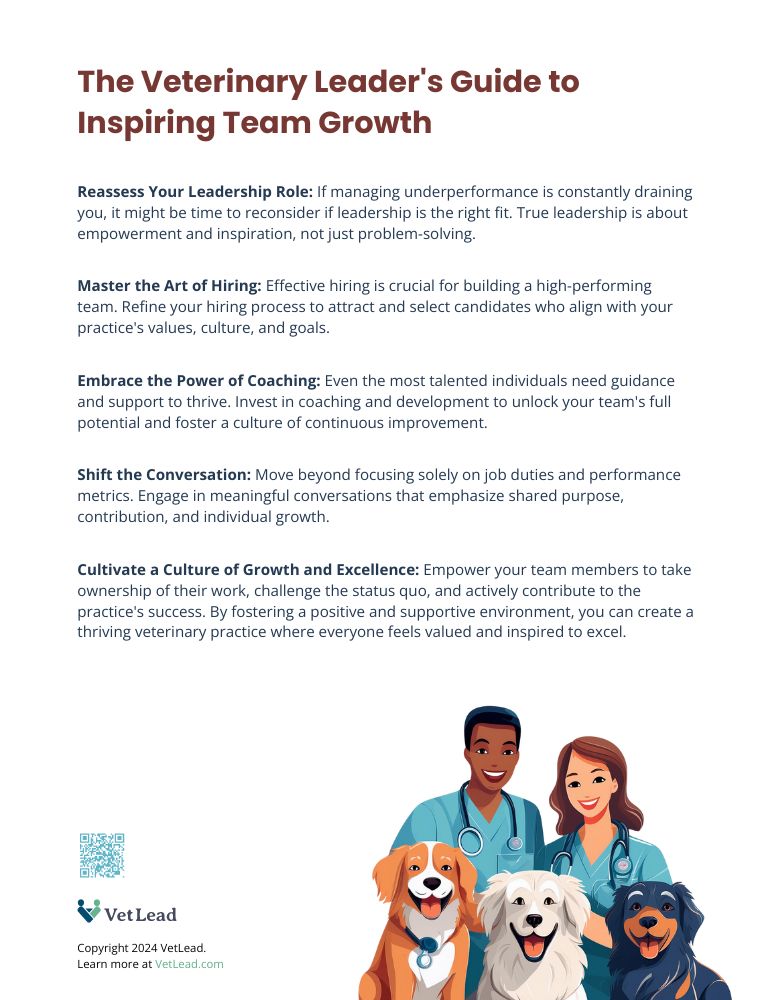Research has revealed a concerning trend: managers across various industries dedicate a significant portion of their time, approximately 17%, to dealing with underperforming employees. That translates to nearly one full workday each week spent addressing issues related to poor performance.
The High Cost of Underperformance in Your Veterinary Practice
Imagine reclaiming that valuable time in your veterinary practice. If you had an extra day each week, how would you utilize it? Would you focus on strategic planning, strengthening client relationships, or pursuing professional development opportunities? It's likely that managing underperforming team members wouldn't be your ideal choice.
Exploring the Roots of the Problem
So, why do so many managers grapple with this issue? Several factors could be at play:
- The "Terrible Employee" Myth: Some managers might believe that a certain percentage of employees are simply destined to be "terrible" and that dealing with their underperformance is an unavoidable part of the job.
- Hiring Challenges: Perhaps the problem lies in ineffective hiring practices, leading to a team that lacks the necessary skills, motivation, or cultural fit.
- Leadership Gaps: It's also possible that employees have untapped potential, but their managers haven't provided the guidance and support needed to help them succeed.
Reassessing Your Leadership Role
If you resonate with the first scenario – believing that dealing with underperformance is an inescapable part of management – it might be time to reconsider your leadership approach.
Leadership is about empowering and inspiring others, not just managing problems. If you find yourself constantly frustrated and overwhelmed by your team's performance, it could be a sign that a different path might be more fulfilling. Explore career options that align with your passions and strengths, allowing you to go home each day feeling good about your progress and achievements.
The Power of Hiring and Coaching in Veterinary Medicine
For those committed to leading their veterinary teams to success, the key lies in mastering two fundamental skills: hiring the right people and coaching them effectively.
Hiring missteps can lead to an uphill battle, with managers spending countless hours trying to coach individuals who simply aren't the right fit for the role or the practice culture. On the other hand, even the most talented individuals can underperform if they lack proper guidance and support.

Bridging the Gap: Effective Coaching for Veterinary Teams
The challenge for many veterinary leaders lies in distinguishing between these two scenarios. How do you know if the issue is with the individual or with your leadership approach?
The answer lies in becoming a more effective coach. By honing your coaching skills, you can create an environment where every team member feels valued, supported, and empowered to reach their full potential. This not only improves individual performance but also strengthens the entire team and contributes to the overall success of the practice.
Coaching and hiring are not just skills; they're essential pillars of effective veterinary leadership. The better you become at these core competencies, the more success you and your team will achieve.
The Impact of Leadership on Employee Engagement
Unfortunately, many managers struggle with developing their leadership skills, leading to a disheartening reality:
- 3 out of 4 employees report that their boss is the worst and most stressful part of their job.
- 58% of people say they would trust a stranger more than their boss.
- Only 26% of workers feel that the feedback they receive helps them improve their work.
These statistics underscore the critical need for leadership development in the veterinary field. By investing in your own growth as a leader and equipping your managers with the tools to coach and inspire their teams, you can create a more positive, productive, and fulfilling work environment for everyone.
Empower Your Team By Elevating Your Leadership
So, ask yourself these questions:
- Do you provide your managers with the training and resources they need to coach effectively?
- Do you equip them with the skills to make informed hiring decisions?
- Are you, as a leader, actively seeking opportunities to enhance your own leadership abilities?
Remember, both managers and employees crave a positive and empowering work environment. Managers want to lead teams that are engaged, motivated, and high-performing. Employees want leaders who can guide them towards growth and success.
The question is: Who will take the first step?

Free PDF: The Veterinary Leader's Guide to Inspiring Team Growth
Ready to elevate your leadership skills and transform your veterinary practice? Join VetLead today and gain access to valuable resources, expert guidance, and a supportive community of veterinary professionals dedicated to achieving excellence.
Have you found ways to elevate your team? Let us know how in the comments below.